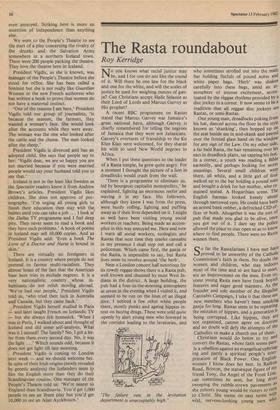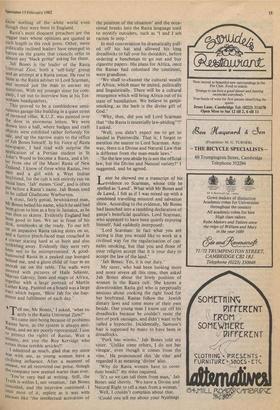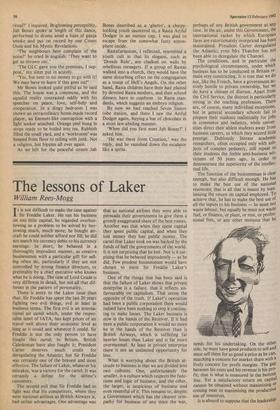The Rasta roundabout
Roy Kerridge No one knows what racial justice may be, and I for one do not like the sound of it. Will there be one law for the black and one for the white, and will the scales of justice be used for weighing ounces of gan- ja? Can Christians accept Haile Selassie as their Lord of Lords and Marcus Garvey as His prophet?
A recent BBC programme on Rastas stated that Marcus Garvey was Jamaica's great national hero, although Garvey is chiefly remembered for telling the negroes of Jamaica that they were not Jamaicans. Garvey's overtures of friendship to the Ku Klux Klan were welcomed, for they shared his wish to send New World negroes to Africa.
When I put these questions to the leader of a Rasta temple, he grew quite angry. For a moment I thought the picture of a lion in dreadlocks would crash from the wall.
`There is a programme to eliminate us, led by bourgeois capitalist monopolists,' he explained, lighting an enormous reefer and waving it in my face. His followers, although they knew I was from the press, were busily rolling, lighting and puffing away as if their lives depended on it. I might as well have been visiting young social workers or teachers. Being made an accom- plice in this way annoyed me. Here and now I warn all social workers, ecologists and Rastas that next time they smoke cannabis in my presence I shall step out and call a policeman. Which came first, the ganja or the Rasta, is impossible to say, but Rasta lives seem to revolve around 'the herb'.
Near a London concert hall notorious for its rowdy reggae shows there is a Rasta pub, well known and shunned by most West In- dians in the district. A large building, the pub had a four-in-the-morning atmosphere at seven in the evening when I visited it, and seemed to be run on the lines of an illegal dive. I noticed a few other white people there, mostly punks and ageing hippies in- tent on buying drugs. These were sold quite openly by alert young men who hovered in the corridor leading to the lavatories, and `The failure rate in the levitation department is unacceptably high.' who sometimes strolled out into the main bar holding fistfuls of pound notes and white paper bags. 'Herb' was shaken carefully into these bags, amid an at- mosphere of intense excitement, accen- tuated by the reggae rhythms provided by a disc jockey in a corner. It now seems to be a tradition that all reggae disc jockeys are Rastas, or semi-Rastas.
One young man, dreadlocks poking from his hat, danced across the floor in the style known as `skanking', then hopped up on the seat beside me in mid-skank and peered over the frosted glass band on the window for any sign of the Law. On my other side, a fat bald Rasta, the hair remaining over his ears in dreadlock plaits, sat tapping his feet. In a corner, a youth was reading a Bible earnestly, and perhaps looking for secret meanings. Several small children were there, all white, and a little girl of four walked up to the bar holding a pound note and bought a drink for her mother, who re- mained seated. A Hogarthian scene. The English barman looked keenly about through narrowed eyes. He could have been an armed bank robber, a defrocked CID of- ficer or both. Altogether it was the sort of pub that made you glad to be alive, once you got out of it. I dare say the police allowed the place to stay open so as to know where to find people. There were no Rasta women there.
C o far the Rastafarians I have met have k..3 proved to be unworthy of the Catholic Commission's faith in them, No doubt the women and children, who stay indoors most of the time and so are hard to meet, are an improvement on the men, Even so, some young Rasta men have frank boyish features and eager good manners. As the founder and sole member of the Illegalise Cannabis Campaign, I take it that these are new members who haven't been smoking ganja for long. Rastas seem to be repeating the mistakes of hippies, and a generation is being corrupted. Like hippies, they are not organised, cannot agree on doctrine and no doubt will defy the attempts of the Catholics to make a church out of them. Christians would do better to try and convert the Rastas, whose faith seems .part- ly a rebellion against an evangelical upbring- ing and partly a spiritual people's inter- pretation of Black Power. One English' woman I know does her best. In Railton Road, Brixton, the statuesque figure of my friend Tony, the Angel of the Front Line' can sometimes be seen, her long dress sweeping the rubble-strewn pavements as she exhorts young would-be rioters to turn to Christ. She seems on easy terms with wild, nervous-looking young men who
know nothing of the white world even though they were born in England.
Rasta's most eloquent preachers are the reggae stars whose opinions are quoted at such length in the rock press. Other, more Politically inclined leaders have emerged to batten on the grants that councils offer to almost any 'black group' asking for them.
Jah Bones is the leader of the Rasta Universal Zion, both a 'self-help' group and an attempt at a Rasta union. He rose to fame as the Rasta adviser to Lord Scarman, and seemed just the man to answer my questions. With my younger sister for com- pany, I set out to interview him at his Tot- tenham headquarters.
This proved to be a tumbledown semi- ruinous garage-like building in a quiet street of terraced villas. R.U.Z. was painted over
the door in enormous letters. We were shown into a hall, where badges and craft
objects were exhibited rather forlornly for
Sale, and up the narrow stairs to the office of Jah Bones himself. In his Voice of Rasta
newspaper, I had read with surprise the application of a Persian student in St John's Wood to become a Rasta, and a let- ter from one of the Maori Rasta of New Zealand. I know of three white Rastas, two Men and a girl with a West Indian boyfriend, for the cult is not entirely run on racial lines. 'Jah' means 'God', and is often Put before a Rasta's name. Jah Bones used to be called Gladstone Warburton.
A stout, fairly genial, bewhiskered man, M, r Bones belied his name, which he said had been given to him as a boy in Jamaica, as he
Was then so skinny. Evidently England had been good to him. We sat in front of his
desk, notebooks at the ready. To our left
sat an impassive Rasta taking notes on us, and a furtive pinch-faced man crouched in a corner staring hard at us both and also scribbling away. Evidently they were very keen not to be misrepresented. A good- humoured Rasta in a peaked cap lounged
behind me, and a glum child of four in an anorak sat on the table. The walls were covered with pictures of Haile Selassie,
Marcus Girvey, lions and maps of Africa, together with a large portrait of Martin
Luther King. Painted on a board was a large tract which began, 'Bless Jah for the hap- Piness and fulfilment of each day.'
4 Tell me, Mr Bones,' I asked, 'what ex-
actly is the Rasta Universal Zion?'
We came into being because of problems Rastas have, as the system is always anti- Rasta, and we are poorly represented. I aim to protect the rights of Rastas. Wait a Minute, are you the Roy Kerridge who writes those terrible articles?'
I admitted as much, glad that my sister Was with me, as young women have a civilising influence. After a moment of unease, we all recovered our poise, though the company now seemed warier than ever. 'You're very bad at writing. Still, the Truth is within I, not vexation,' Jah Bones conceded, and the interview continued. I omit most of it, replete as it was with Phrases like 'the intellectual activation of
the position of the situation' and the occa- sional breaks into the Rasta language used to mystify outsiders, such as 'I and I seh racism fe stop.'
In mid-conversation he dramatically pull- ed off his hat and allowed his long dreadlocks to fall over his shoulders, before ordering a henchman to go out and buy cigarette papers. His plans for Africa, once the Rastas had colonised the continent, were grandiose.
'We shall re-channel the cultural wealth of Africa, which must be united, politically and linguistically. There will be a cultural resurgence which will bring Africa out of its state of humiliation. We believe in ganja- smoking, as the herb is the divine gift of God.'
'Why, then, did you tell Lord Scarman that "the Rasta is essentially law-abiding"?' I asked.
'Well, you didn't expect me to get us landed in Pentonville. That is, I forgot to mention the matter to Lord Scarman. Any- way, there is a Divine and Natural Law that is different from the man-made laws.'
`So the law you abide by is not the official law, but the Divine and Natural variety?' I suggested, and he agreed.
Later he showed me a transcript of his evidence .to Scarman, whose title he spelled as 'Lawd'. What with Mr Bones and de Lawd, I felt as if I was mixed up with a combined travelling minstrel and salvation show. According to the evidence, Mr Bones had launched into a rambling declaration of ganja's beneficial qualities. Lord Scarman, who appeared to have been quietly enjoying himself, had suddenly interposed:
'Lord Scarman: In fact what you are saying is that you would like to work in a civilised way for the regularisation of can- nabis smoking, but that you and those of your religion accept that it is your duty to accept the law of the land.'
`Jail Bones: Yes, it is our duty.'
My sister, who had been looking more and more severe all this time, then asked Jah Bones about the lowly position of women in the Rasta cult. She knows a downtrodden Rasta girl who is perpetually anxious about cooking the right food for her boyfriend. Rastas follow the Jewish dietary laws and some more of their own beside. One young man I know cut off his dreadlocks because he couldn't resist the lure of pork sausages, and didn't want to be called a hypocrite. Incidentally, Samson's hair is supposed by many to have been in dreadlocks.
'Pork has worms,' Jah Bones told my sister. 'Unlike some others, I do not bar vinegar, even though it comes from the vine.' He pronounced this 'de vine' and regarded it as meaning 'divine' also.
'Why do Rasta women have to cover their heads?' my sister inquired.
'It's so we can tell them from man,' Jah Bones said shortly. 'We have a Divine and Natural Right to tell a man from a woman.'
Well, I couldn't complain about that.
'Could you tell me about your Nyabingi ritual?' I inquired. Brightening perceptibly, Jah Bones spoke at length of this dance, performed to drums amid a haze of ganja smoke and put on record by one Count Ossie and his Mystic Revelations.
'The neighbours here complain of the noise!' he cried in anguish. 'They want to get us thrown out.'
'The GLC gave you the premises, I sup- pose,' my sister put in acutely.
'Yes, but next to no money to go with it! We may have to leave if this goes on!'
Mr Bones looked quite pitiful as he said this. The house was a commune, and the squalid reality contrasted oddly with his speeches on peace, love, self-help and cooperation. In a dingy bedroom I was shown an extraordinary home-made record player, an Emmett-like contraption with a light socket attached. Orange peel hung in strips ready to be boiled into tea. Rubbish filled the small yard, and a 'workroom' was heaped from floor to ceiling with junk. Not a religion, but hippies all over again.
As we left for the peaceful streets Jah Bones described as a 'ghetto', a chirpy- looking youth sauntered in, a Rasta Artful Dodger in an outsize cap. I was glad to escape from the somewhat fusty atmos- phere inside.
Rastafarianism, I reflected, resembled a youth cult in that its slogans, such as 'Dreads Rule', are chalked on walls by rebellious teenagers. If a group of Rastas walked into a church, they would have the same disturbing effect on the congregation as a troop of Hell's Angels. On the other hand, Rasta children have their hair plaited by devoted Rasta mothers, and their school dinners have to conform to Rasta stan- dards, which suggests an embryo religion.
By now we had reached Seven Sisters tube station, and there I saw the Artful Dodger again, buying a bar of chocolate in a most law-abiding manner.
'When did you first meet Jah Bones?' I asked him.
'He was there from Creation,' was the reply, and he vanished down the escalator like a sprite.












































 Previous page
Previous page